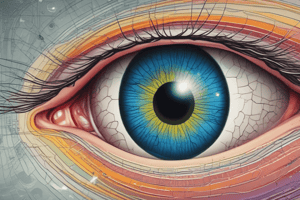Podcast
Questions and Answers
Which of the following is the most common type of acute optic neuritis?
Which of the following is the most common type of acute optic neuritis?
- Para-infectious
- Infectious
- Demyelinating (correct)
- Non-infectious
What type of visual field defect is associated with acute optic neuritis?
What type of visual field defect is associated with acute optic neuritis?
- Central and centrocecal scotoma (correct)
- Peripheral scotoma
- Hemianopia
- Altitudinal scotoma
What symptom is associated with acute optic neuritis?
What symptom is associated with acute optic neuritis?
- Chronic painless visual reduction
- Acute painful diminution of vision (correct)
- Chronic tearing
- Intermittent double vision
Which infective agent can directly cause optic neuritis?
Which infective agent can directly cause optic neuritis?
Which clinical sign is least likely to be seen in retrobulbar neuritis?
Which clinical sign is least likely to be seen in retrobulbar neuritis?
What treatment is used for resistant cases of acute optic neuritis?
What treatment is used for resistant cases of acute optic neuritis?
Which of the following findings is characteristic of papillitis but NOT papilloedema?
Which of the following findings is characteristic of papillitis but NOT papilloedema?
Which classification of optic neuritis involves the optic disc?
Which classification of optic neuritis involves the optic disc?
Flashcards are hidden until you start studying
Study Notes
Acute Optic Neuritis
- Inflammation of the optic nerve
Classification
- Demyelinating: most common, associated with multiple sclerosis
- Para-infectious: occurs after viral infection or immunization
- Infectious: direct infection with Herpes Zoster or invading from surrounding orbit or brain
- Non-infectious: associated with sarcoidosis
Clinical Classification
- Papillitis: inflammation at the optic disc
- Retrobulbar neuritis: inflammation of the optic nerve behind the eye
Clinical Picture
Symptoms
- Acute painful loss of vision
- Pain exacerbated by adduction and elevation of the eye due to optic nerve sheath stretch
Signs
- Mild to severe visual loss (6/12 to PL)
- Impaired color vision
- Relative afferent pupillary defect (RAPD)
- Central and centrocecal scotoma for red and green
Fundus Picture
- Retrobulbar neuritis: normal fundus
- Papillitis:
- Blurred disc margin and disc swelling
- Obliteration of physiological cup
- Disc hyperemia and splinter hemorrhage
- Vitreous cells
Differential Diagnosis
- Papilloedema: usually bilateral, good V/A, severe disc swelling, enlarged blind spot, normal vitreous, normal pupil reaction
- Papillitis: usually unilateral, severe drop in vision, moderate disc swelling, central and centrocecal scotoma, vitreous opacities (cells), RAPD
Treatment
- Methylprednisolone (250 mg I.V every 6 hours for three days) followed by Prednisone tablets (1mg/Kg daily for 11 days)
- Multi-vitamins
- Interferon for resistant cases
Studying That Suits You
Use AI to generate personalized quizzes and flashcards to suit your learning preferences.


